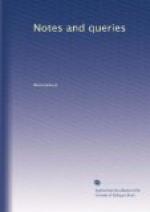This happened in 630 at Orleans, and the holy abbot who attests the miracle was present when it occurred. Had St. Amand learnt ventriloquism during his missionary excursions?
And now permit me to tell your correspondent CH. that Abp. Bramhall’s Dutch is quite correct. “Mevrouw” is still the title of empresses, queens duchesses, Countesses, noble ladies, ministers of state’s and other great men’s wives.
G.M.
Guernsey.
A Hint for Publishers.—Many, like myself, have no doubt experienced the inconvenience of possessing early impressions of books, of which later editions exist with numerous emendations and errata.
Would it not be practicable for publishers to issue these emendations and errata in a separate form and at a fair price, for the benefit of the purchasers of the preceding editions?
Were this plan generally adopted, the value of most books would be materially enhanced, and people would not object, as they now do, to order new publications.
HERBERT.
“He who runs may read.”—There appeared in Vol. ii., p. 374., a new, and, in my opinion, an erroneous, interpretation of part of ver. 2., chap. ii. Habakkuk. It appears to me probable that a person reading the vision might be struck with awe, and so “alarmed by it” as not to be able “to fly from the impending calamity” in the way which your correspondent imagines. I prefer Archbishop Newcome’s explanation:—“Let the characters be so legible that one who hastily passeth on may read them. This may have been a proverbial expression.”
If you be pleased to insert this, readers may judge for themselves which is the right interpretation.
PLAIN SENSE.
The Rolliad.—The following memoranda relative to this word were given to me by one who lived during the period of its publication, and was, it is believed, himself a contributor. Wraxall, in his Memoirs, states that the work was nearly all written by Richardson; this is not true. The principal writers were Gen. Fitzpatrick, Lord John Townshend, Dr. Lawrence—he had the chief control. They met in a room at Becket’s, the bookseller; they had a secretary and copyist.
None of the contributions went to the newspaper in the original handwriting. The Morning Herald was the paper it is believed, in which they first appeared, although that journal was on the eve of going over to the opposite party. The “ode” to Wraxall, was written by Tickell, author of “Anticipation.”.
W.A.
November, 23. 1850.
The Rolliad.—
From The Times, about 1784.
ROLLIAD.
Political Eclogues.
ROSE.
Line 21. ed. 1795.
“Mr. Rose, Mr. Rose,
How can you suppose
I’ll be led by the nose,
In voting for those
You mean to propose,
Mr. Rose, Mr. Rose?”




